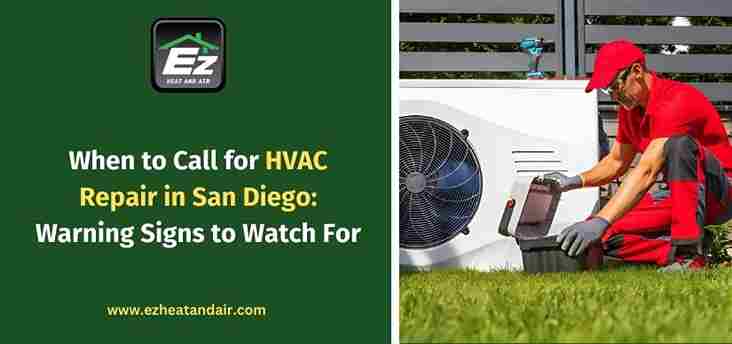When to Call for HVAC Repair in San Diego: Warning Signs to Watch For
Views : 1018

Weak airflow from vents.
- A clogged air filter.
- Leaky or obstructed air ducts
- A failed blower motor.
Strange Sounds Emerging from Your HVAC System
- Banging or clunking: Loose or broken components
- Whistles or hisses: Possible air leaks in the ducting.
- Squealing: Belt wear or motor malfunction.
- Buzzing signals: An electrical issue.
Increased Energy Bills Without Explanation
- Dirty air filters
- Refrigerant leak.
- Faulty thermostat.
- An aging system in need of service.
Frequently cycling on and off
- faulty thermostat
- Filters that are dirty or clogged
- Overheating owing to ventilation difficulties.
- System improperly sized
Uneven Heating and Cooling at Home
- Improperly sized HVAC equipment
- Blocked or leaking ductwork
- A malfunctioning thermostat sensor
Strange or bad smells.
- Burning Smell: Overheating components or problems with electrical wiring.
- Musty Odor: Possible growth of mold or mildew in the ducts.
- Rotten Egg Smell: Gas Leak (switch off the system immediately and contact an expert).
Water Leaks or Excess Moisture Around the Unit
- A clogged condensate drain line.
- A refrigerant leak.
- A frozen evaporator coil.
The thermostat is malfunctioning.
- The HVAC system is unresponsive when the temperature alters.
- The displayed temperature is different from the actual room temperature.
- The system does not turn on or off.
Your air conditioner has been in use for more than a decade.
Poor Air Quality of Indoor
- A dirty air filter.
- Clogged ductwork.
- Mold growth in the system.
Conclusion
FAQs
Q1. When is the recommended service interval for my HVAC systems?
To improve operational efficiency and prevent system failure, servicing is generally recommended twice a year: in late spring or early summer before the cooling season is due to commence, and in late fall or early winter in readiness for the heating season.
Q2. What major signs indicate that my HVAC system needs urgent repairs?
Some of the more obvious signs that might tell you whether your system needs real repair include ineffective airflow, strange sounds, higher energy costs, temperature inconsistencies, and frequent on-or-off cycling. Never assume; when in doubt, always call for a professional HVAC repair service in San Diego.
Q3. What are the costs imposed by HVAC repair in San Diego?
The minor jobs that need to be taken under the HVAC service in San Diego will generally be charged in the range of $100-$500, whereas the major repairs done will cost well over $1,000.
Q4. Can I do minor fixes myself?
The owner is capable of doing anything simple, such as changing filters, but if anything calls for slightly more skill than that, it is better handled by a repair person. Anything attempted without due care may render the item warranty ineligible or even cause great harm.
Q5. What should I do if my HVAC system goes entirely dead?
Consider checking for a faulty thermostat, a filthy air filter, or an open circuit breaker. If this does not restore HVAC system functionality, contact a professional HVAC repair in San Diego to diagnose and solve the problem.